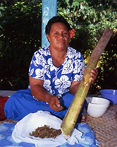 |
Samoa, Campus Contract Helps AIDS-Cure Search
|
|
|
|
 |
 |
|
|
| Samoan Ake Lilo prepares an anti-viral extract from bark of mamala tree. |
|
|
|
The
University of California, Berkeley, has signed an agreement
with the Samoan government to isolate from an indigenous
tree the gene for a promising anti-AIDS drug and to
share any royalties from sale of a gene-derived drug
with the people of Samoa. The agreement supports Samoa's
assertion of national sovereignty over the gene sequence
of Prostratin, a drug extracted from the bark of the
mamala tree (Homalanthus nutans). "A microbial
source for Prostratin will ensure a plentiful, high-quality
supply if it is approved as an anti-AIDS drug,"
said Jay Keasling, head of the Synthetic
Biology Department at Berkeley Lab. Full
story.

Oceans Might Add
To Earth's Rock 'n' Roll
By
Glennda Chui
|
|
|
|
 |
 |
|
|
| Romanowicz |
|
|
|
Scientists
think they have found the source of a mysterious hum
that reverberates through the Earth, too low for human
ears to hear. They used to think it came from earthquakes,
but even when there are no big quakes, the hum continues,
a slow, steady slosh of waves around the planet. Now,
researchers have pinpointed the source. The hum, they
say, starts in the oceans, when winter storms whip the
waves into a frenzy. "These waves interact with
each other to create longer waves that reach deep into
the ocean, all the way to the ocean floor,'' said UC
Berkeley professor and Berkeley Lab earth scientist
Barbara Romanowicz. Full
story.

|
 |

